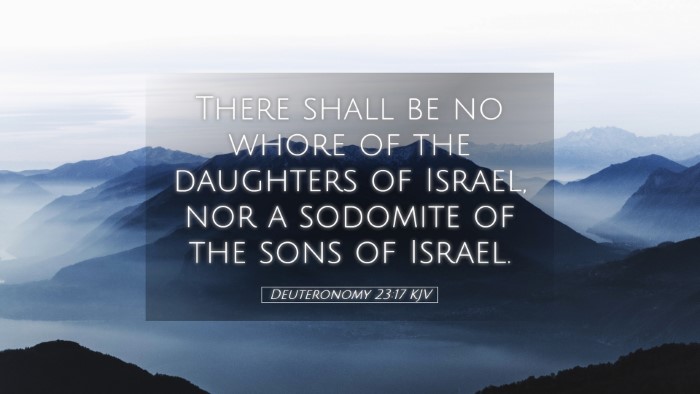Commentary on Deuteronomy 23:17
Verse: "There shall be no whore of the daughters of Israel, nor a sodomite of the sons of Israel."
Introduction
The passage from Deuteronomy 23:17 reflects the moral and social values central to the covenant community of Israel. This verse, with its clear prohibitions against certain immoral behaviors, serves as a guide for maintaining holiness and purity within the community. Below, we will explore various insights from established biblical commentaries to provide a deeper understanding of the implications of this verse.
Historical Context
This commandment is part of a larger section where Moses delivers laws about purity and holiness, addressing the Israelites before they enter the Promised Land. The historical context indicates that these prohibitions were meant to delineate the Israelites from the cultures surrounding them, which often engaged in practices harmful to community integrity and personal morality.
Exegesis and Analysis
Moral Integrity
Matthew Henry emphasizes that the essence of this verse centers on the call to moral integrity among the Israelites. The term "whore" points to sexual immorality that tarnishes the dignity of women and undermines the familial structure ordained by God. Similarly, the term "sodomite" highlights practices that defy the created order and the intended design for human sexuality.
Holiness of Community
Albert Barnes notes that these instructions were not arbitrary but were tied to the covenant relationship between God and Israel. The purity of the people was critical for receiving God’s blessings. Each act of immorality or idolatry was seen as a direct affront to God’s holiness and could bring about communal judgment. Thus, these prohibitions aimed to protect the collective identity and moral fabric of the Israelite community.
Gender Dynamics
Adam Clarke provides valuable insights concerning the roles of women and men in this context. The mention of "whore" relates to the societal treatment and objectification of women, reinforcing the need for respect and protection. On the other hand, the reference to "sodomite" serves to remind men of their obligations to uphold righteousness, as male promiscuity particularly leads the community into moral decay. The implications of this command extend to the ethical responsibilities inherent in all interpersonal relationships.
Theological Implications
This verse brings to light essential theological themes concerning sin, sanctity, and the nature of the covenant community.
- Sin and Its Consequences: The gravity of sin is presented as not just individual but communal, indicating that the actions of individuals affect the entire community before God.
- Holiness: The command affirms the call for holiness in personal conduct, reminding believers that they are set apart for divine purposes.
- Covenant Identity: The adherence to such regulations is integral for understanding the Israelite identity as a people chosen by God, meant to reflect His character to the world.
Practical Applications
The relevance of this verse transcends its historical context and speaks to contemporary issues faced by communities of faith today. Pastors, students, and theologians can draw several applications:
- Community Accountability: Encouraging communal accountability in matters of morality is essential. Just as the Israelites were called to uphold a standard, modern faith communities must actively promote moral integrity.
- Respecting Relationships: A call to maintain respectful relationships should resonate in teachings related to the dignity of all individuals, stressing the importance of treating others with honor.
- Defining Righteousness: Pastors and leaders should guide their congregations in understanding biblical definitions of righteousness, ensuring that congregants are informed about what constitutes sin in light of Scripture.
Conclusion
Deuteronomy 23:17 serves as a pertinent reminder of the importance of maintaining moral integrity within God’s covenant community. The insights from various public domain commentaries elucidate the seriousness of these prohibitions and their implications for both ancient Israel and today's church. As believers seek to engage with the world, the teachings from this verse provide a foundational understanding of how to live in a manner that reflects God’s holiness and purposes.


